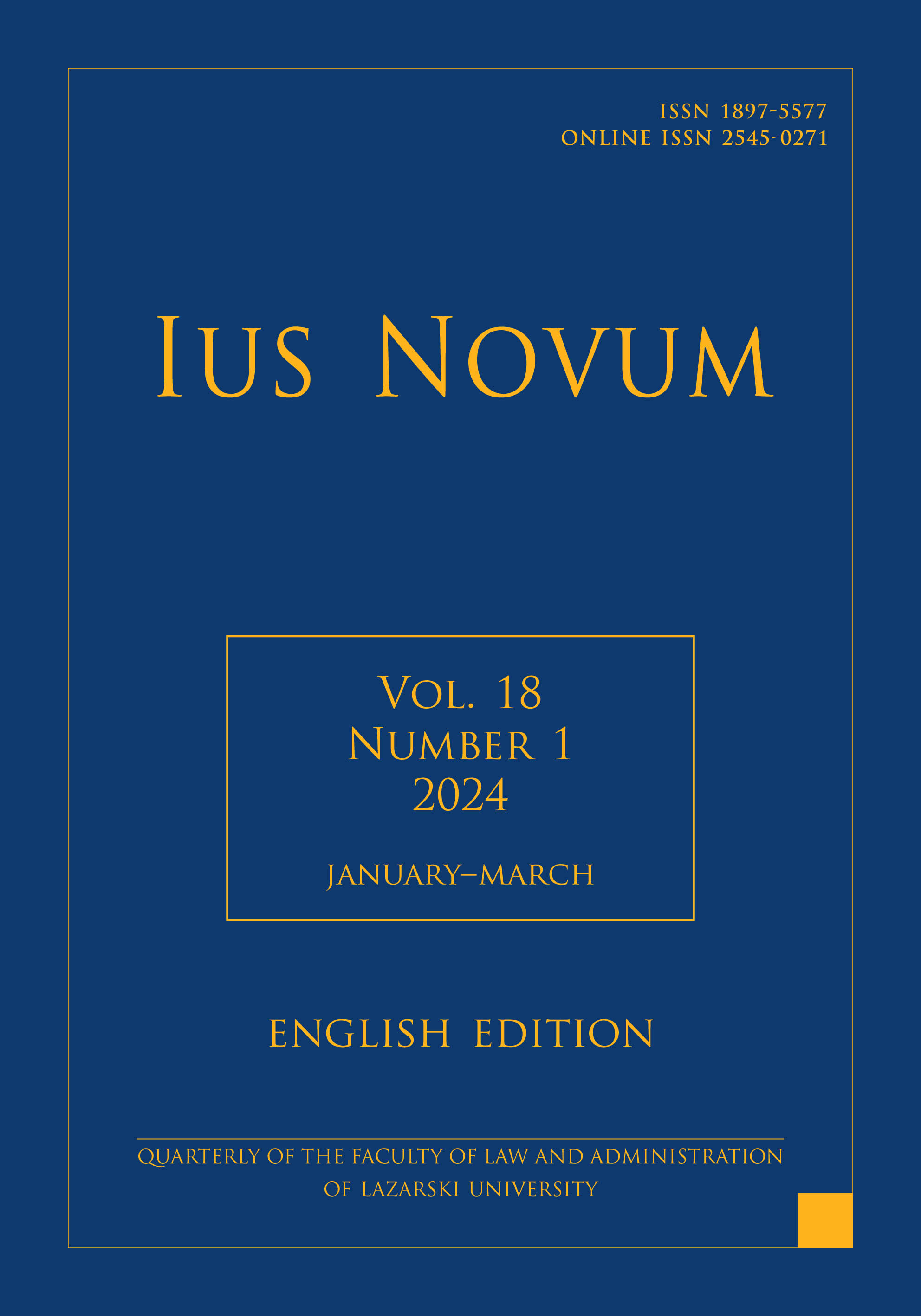Abstrakt
This article aims to delineate the boundaries of the evidence initiative of the Court of the First Instance, which bears the responsibility to fulfil the goals of criminal proceedings, as outlined in Article 2 § 1 item 1 and § 2 of the Code of Criminal Procedure, from the perspective of evidence reliability, an essential component of the fair criminal trial concept. The court’s evidentiary actions
were thus examined through the lens of requirements stemming from Article 6(1) and (3) of the ECHR, especially the principles of independence, impartiality, adversarial process, immediacy, and access to criminal proceeding materials. The article adopts a dogmatic approach, building on an analysis of current national legal standards and the Rome Convention’s provisions, viewed through doctrine and jurisprudence of national courts and the Court in Strasbourg. This makes the publication relevant for both legal scholars and practitioners involved in criminal proceedings. The analysis suggests that the court’s initiative to introduce evidence, its methods of evidence gathering, and access to collected materials during proceedings must not curtail the rights of the parties, especially the accused, to conduct their evidentiary activities. Depriving the court of the primacy of independence and impartiality, restricting the parties’ capacity to engage in dispute in favour of an inquisitorial jurisdictional body violates the right to fair evidentiary proceedings. The court, in safeguarding the principle of material truth, must remember its role as a justice administrator and balance all arguments accordingly. Seeking evidence solely to establish the accused’s guilt contradicts the procedural function of adjudication and compromises the court’s neutrality, making it an extension of the prosecution. Hence, a thorough elucidation of case circumstances by the court should not disempower the parties, particularly regarding their initiative to present evidence.
Bibliografia
Barącz, M., ‘Pojęcie i cechy “uczciwego procesu”’, Państwo i Prawo, 1991, No. 2.
Cieślak, M., Dzieła wybrane. Tom I. Zagadnienia dowodowe w procesie karnym, Waltoś, S. (ed.), Kraków, 2011.
Cieślak, M., Polska procedura karna. Podstawowe założenia teoretyczne, Warszawa, 1984.
Gaberle, A., Dowody w sądowym procesie karnym, Warszawa, 2010.
Gardocka, T., ‘Podstawowe zasady postępowania dowodowego na rozprawie głównej’, Studia Iuridica, 1985, No. 13.
Hofmański, P., Świadek anonimowy w procesie karnym, Kraków, 1998.
Grzegorczyk, T., in: Grzegorczyk, T., Tylman, J., Polskie postępowanie karne, Warszawa, 2011.
Kmiecik, R., in: Kmiecik, R. (ed.), Prawo dowodowe. Zarys wykładu, Kraków, 2005.
Kremens, K., ‘Dostęp sądu do akt postępowania przygotowawczego po nowelizacji k.p.k. – czego powinniśmy nauczyć się od Amerykanów’, in: Wiliński, P. (ed.), Kontradyktoryjność w polskim procesie karnym, Warszawa, 2013.
Kuczyńska, H., Analiza porównawcza modelu rozprawy głównej. Między kontradyktoryjnością a inkwizycyjnością, Warszawa, 2022.
Jasiński, W., ‘Zasada bezstronności’, in: Wiliński, P. (ed.), System Prawa Karnego Procesowego. Tom III. Cz. 2, Warszawa, 2014.
Lach, A., Rzetelne postępowanie dowodowe w sprawach karnych w świetle orzecznictwa strasburskiego, Warszawa, 2018.
Murzynowski, A., Istota i zasady procesu karnego, Warszawa, 1994.
Nowak, C., ‘Prawo do rzetelnego procesu sądowego w świetle EKPC i orzecznictwa ETPC’, in: Wiliński, P. (ed.), Rzetelny proces karny, Warszawa, 2009.
Nowicki, M.A., Wokół Konwencji Europejskiej. Komentarz do Europejskiej Konwencji Praw Człowieka, Warszawa, 2010.
Pagiela, A., ‘Zasada “fair trial” w orzecznictwie Europejskiego Trybunału Praw Człowieka’, Ruch Prawniczy, Ekonomiczny i Społeczny, 2003, No. 2.
Stefański, R.A., ‘Referat rzetelne postępowanie przed sądem pierwszej instancji’, in: Skorupka, J., Jasiński, W. (eds), Rzetelny proces karny. Materiały konferencji naukowej Trzebieszowice 17–19 września 2009 r., Warszawa, 2010.
Szymanek, J., ‘Pojęcie rzetelnego procesu sądowego’, in: Szymanek, J. (ed.), Rzetelny proces sądowy. Doktryna. Prawo. Praktyka, Warszawa, 2021.
Świecki, D., Bezpośredniość czy pośredniość w polskim procesie karnym. Analiza dogmatycznoprawna, Warszawa, 2013.
Waltoś, S., ‘Kontradyktoryjność a prawda materialna’, in: Wiliński, P. (ed.), Kontradyktoryjność w polskim procesie karnym, Warszawa, 2013.
Waltoś, S., Hofmański, P., Proces karny. Zarys systemu, Warszawa, 2018.
Wędrychowski, M.P., ‘Prawo do “uczciwiej rozprawy” w Europejskiej Konwencji Praw Człowieka’, Przegląd Sądowy, 1991, No. 2.
Wiliński, P., ‘Pojęcie rzetelnego procesu karnego’, in: Gerecka-Żołyńska, A., Górecki, P., Paluszkiewicz, H., Wiliński, P. (eds), Skargowy model procesu karnego. Księga ofiarowana Profesorowi Stanisławowi Stachowiakowi, Warszawa, 2008.
Wiliński, P., ‘Pojęcie rzetelnego procesu karnego’, in: Wiliński, P. (ed.), Rzetelny proces karny, Warszawa, 2009.
Woźniewski, K., Inicjatywa dowodowa w polskim prawie karnym procesowym, Gdańsk, 2001.

Utwór dostępny jest na licencji Creative Commons Uznanie autorstwa – Użycie niekomercyjne – Na tych samych warunkach 4.0 Międzynarodowe.

